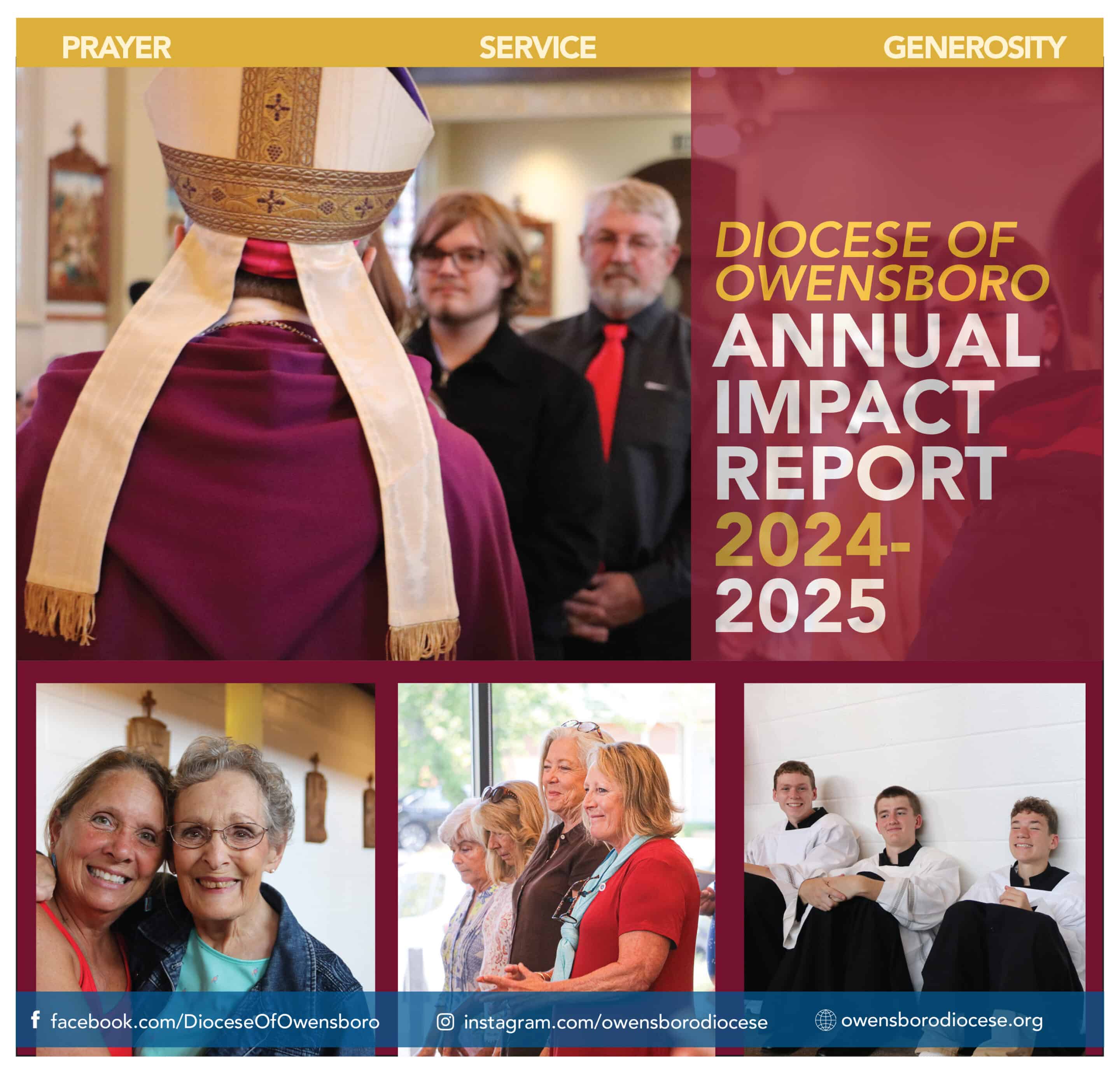OCHS-bound, Holy Name grad places third in national essay contest on historic Boston Massacre

Patrick Hauke, who graduated from Holy Name of Jesus Catholic School in Henderson in spring 2021 and will be a freshman at Owensboro Catholic High School in Owensboro in fall 2021, recently received third place in a Daughters of the American Revolution essay contest. COURTESY OF HAUKE FAMILY
BY ELIZABETH WONG BARNSTEAD, THE WESTERN KENTUCKY CATHOLIC
In writing his essay, which placed third in a national essay contest, Patrick Hauke sought to “put on the shoes of someone who experienced not only the Boston Massacre but someone who was really influenced by it,” said Patrick.
Patrick, who graduated eighth grade from Holy Name of Jesus Catholic School in Henderson in spring 2021, wrote “The Boston Massacre: The Effect on my Family,” for the Daughters of the American Revolution essay project, which was open to grades sixth through eighth.
His essay tells a fictional, albeit sobering, account of a colonial era journalist who witnessed the increasing tension caused by British oversight among the colonies and the resulting Boston Massacre tragedy.
“These victims from the Boston Massacre did not die in vain but are as heroic as those who fought in Saratoga or Bunker Hill,” Patrick wrote in the persona of the journalist.
He initially won the local competition – judged by the Samuel Hopkins chapter of Daughters of the American Revolution, located in the Henderson area – in January.
In March, when he was anticipating the results of the district competition, Patrick was told in class before all his classmates: “Patrick, you won state!”
“That was a surprise for me because I thought this was just for district,” said Patrick.
Patrick’s mother, Deborah Hauke, said she was “so proud of him” when he came home from school that day and shared the good news.
He received word in the mail in June when he won first place in the East Central division, and also received word by mail in July that he had placed third in the national competition.
He and his family were thrilled.
“It was a neat surprise to receive in the mail!” said Deborah.
Jeff Hauke, Patrick’s father, said that Patrick is their youngest and that “he has been following in the footsteps of his older siblings.”
Patrick said he had learned about the contest from his teacher at Holy Name, Emma Bridges. It was entirely voluntary and something students would do on their own.
“I said sure and got to work right away,” said Patrick.
He said it wasn’t restricted to descendants of those who were involved in the Revolutionary War; to his knowledge he does not have any American Revolution ancestors.
“I would sit and do research,” said Patrick, who said the essay took him somewhere between three weeks to a month to complete.
Initially he wrote one essay, but then he thought to himself “I could do better than that.” So he tossed the first draft and then “wrote it from scratch.”
“In total I spent probably 10-20 hours fact-checking,” said Patrick.
This fall, Patrick will continue on the path of Catholic education as he enters Owensboro Catholic High School in Owensboro as a freshman.
“I think it’ll be a great high school experience,” he said. “I’m really excited to continue learning the Catholic faith and learning in general.”
His parents agree.
“We’re super proud of Patrick; he’s really excelling in whatever he does and we’re so proud of him,” said Deborah.
Below is Patrick Hauke’s winning essay, reprinted with permission:
The Boston Massacre
The Effect on my Family
Starting in 1607 with the establishment of Jamestown, tension between the British and their newly born territory was regularly present. Unfair taxation on the colonies by the British government escalated this tension. The Stamp Act outraged myself and my family. I write for the Pennsylvania Journal. As a newspaper columnist, the Stamp Act increased the prices of my paper. Consequently, this decreased the number of readers and my salary.
Our newspaper was one of the first to condemn the British and their actions: we are not afraid to hide our resentment toward the British government. My most notable article was written about my outrage when I heard the account of the Fifth of March 1770.
There were several legislative acts leading up to the Boston Massacre. At first, the Stamp Act, a tax placed on all paper materials, was enacted. This greatly reduced my readers and initiated my press into financial hardship. To increase tension yet again, the Townshend Act imposed a tax on all imported goods. My family stood in protest; my wife began sewing her own clothes for our family rather than importing British clothing. She also hosted several spinning bees to encourage other women to follow her boycott.
The Sons of Liberty helped with the boycott. They posted signs bearing the word ¨IMPORTER¨ on stores known to import goods from the British. Many adolescents are eager to protest. My son was one of these protesters. I told him not to join in but he ignored requests. On February 22, 1770, a sign was posted on the shop of Theophilus Lillie. Many children began throwing sticks and mud at the store. Ebenezer Richardson, a neighbor, came out to see what the commotion was about.
Being a known traitor, the rioters targeted Richardson as well, forcing him back into his home, which was surrounded by patriots now. He retrieved his musket and fired. The bullet hit the chest of eleven-year-old Christopher Seider. He died hours later. After his death, we deemed these barbaric Acts as an abuse of Parliament’s power and refused to follow them. Since we were unwilling to comply, the King ordered a total of 2,000 troops to enforce these unfair laws.
Finally, the tension had grown too strong. Hugh White, a British soldier, was guarding the King’s money stored inside a house on King Street. White and a colonist began to argue about paying off a debt, with White demanding money. He eventually struck the colonist with the butt of his gun. Colonists that were watching the dispute began insulting and threatening White. Eventually, he began fighting back, causing the colonists to throw stones and snowballs at him. Led by Captain Thomas Preston, several redcoats came for reinforcements. Violence increased, even to the point of the colonists striking the soldiers with clubs and sticks. In the midst of all the commotion, someone yelled, “Fire!” causing one person to fire their gun. Other soldiers began shooting, killing five and wounding six.
The colonists quickly set a trial in place for these men, in which John Adams defended the men with the belief that everyone deserves a fair trial. The court’s verdict found two soldiers guilty of manslaughter. The ruling angered the colonists because of the lack of severity of their punishment. Many people wanted to begin a war and gain independence.
After this attack, we, the colonists were truly ready to rebel. We staged the Boston Tea Party, in which my fellow colonists and I threw 342 chests of tea overboard into the Boston Harbor, dressing up as Indians to avoid being caught. This developed further tension between the colonists and the British rule.
Another key event was the First Continental Congress which created the Declaration of Rights. Simply stated, this document explained that we were loyal to the British King, but refused to pay the taxes he set upon us. We created an organized militia to fight British forces when necessary. Battle broke out in Lexington and Concord and the Revolutionary War was officially underway.
In conclusion, the Boston Massacre was crucial in fueling the American Revolution. It ignited strong patriotism for independence, even if that meant a war. I heard John Adams once say, “How slightly however, historians may have passed over this event, the blood of the Martyrs, right, or wrong, proved to be the seeds of the Congregation. Not the Battle of Lexington or Bunkers Hill; not the surrender of Burgoyne, or Cornwallis, were more important events in American history than the battle of King Street, on the 5th of March 1770.” These victims from the Boston Massacre did not die in vain but are as heroic as those who fought in Saratoga or Bunker Hill.
Originally printed in the September 2021 issue of The Western Kentucky Catholic.

